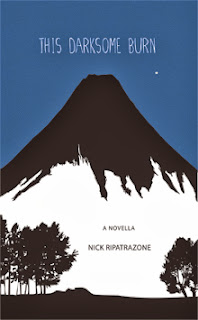Nick
Ripatrazone. Firth Forth Books, $10.95 paperback (66p)
There’s
a small whorl of chaos in the widower Luke’s life that starts to spin from the
beginning, when he comes home to find his college-aged daughter Aurea raped and
his son Ford locked in the basement.
Just before that, his last horse was lost in the woods, possibly eaten
by wolves. It doesn’t let up much from
there. Nick Ripatrazone’s This Darksome Burn is a spare book with
barely a memory of a smile.
For a lesser writer, that’s all it
would be—a dreary, humorless slog. But
Ripatrazone is mostly careful in his dramatic choices, delivering them not for
their maximum emotional impact, but for their thematic relevance. When characters face conflict the reader is
not manipulated into a position of empathy or rage, but is invited to relate
that conflict to the other more abstract ideas that Ripatrazone feeds into his
prose. The family drama boils on the
front burner while broader themes of nature and choice gently simmer on the
back.
And all throughout is that darksome
burn from the title, a tiny stream bending through the woods that has a massive
literal and figurative presence in the lives of Luke and his family. The title is taken from the first line of a
Gerard Manley Hopkins poem. In it,
Hopkins describes the path a minor stream takes as it meanders through a downy
landscape before finishing with the plea: “What would the world be, once
bereft/ Of wet and of wildness? Let them
be left,/ O let them be left, wildness and wet;/ Long live the weeds and the
wilderness yet.” It’s a disorienting
choice to put this poem alongside this novella, as Hopkins’ nature could only
be described as lush and fertile, while Ripatrazone’s wilderness only holds
feral pigs and bad history. The
“darksome” of this title is more sinister than its source.
Ripatrazone is a strong lyric
writer, and even within the limits of his extremely brief chapters told from
varying character perspectives, he is able to bring out his deeper ideas
through relatively small actions and dialogues.
Everything is muted, and when there is an action described, it is
usually a small one, a minor detail carefully observed. The story doesn’t move through throwdown
shouting matches, but with seemingly minor conversations about college credits
transferring, and a quick image of the way steam from a soup bowl curls under
Aurea’s chin.
Ripatrazone is so good at telling more
by saying less that when he does go broad, when the conflict is made explicit
on the page or a thematic moment is less than understated, it comes off as a
shout: This is important! he seems to
say. A novel this slim can’t sustain
heavy prose without coming off as portentous, especially as it is written in
the present tense—the narration sometimes reads as intoned from high rather
than simply told. Some passages are so
obviously weighted with meaning that they bring the book to a full stop:
“[Ford] sits at the table, Butler’s Lives
of the Saints open to an entry on Saint Augustine. ‘This is what I want to
be.’” Thud.
I’d like for Ripatrazone to write a
novel longer than the slim 61 pages of This
Darksome Burn. He has a talent for
realizing the complexities of a family story using atypical means, but this
book didn’t have the time to pull out enough of those threads, leaving some of
the character’s actions muddled, and its slightly ambiguous ending
unearned. If he had more time and room
to breathe, I can see him chronicling a larger and more complete family drama
while retaining his lyric edge—think Franzen with an editor and a poet’s
tongue.
Whether it’s the fertile and
flourishing qualities of Hopkins’ wilderness, or Ripatrazone’s more threatening
version, both would agree that there is something extra-human about the
woods. Hopkins would consider it
divine—“Long live the weeds and the wilderness yet.” Luke and his clan may think it something
else. The young boy Ford asks Shope the
stable hand to help him find the horse lost out in the forest. “You think it’s that easy?” the plain-talking
Shope replies. “Those are big
woods. Bigger than you could ever
imagine.” (October 2013)
Purchase This Darksome Burn HERE.
Reviewer bio: Tom Taff lives and
works in Saint Paul, Minnesota.
